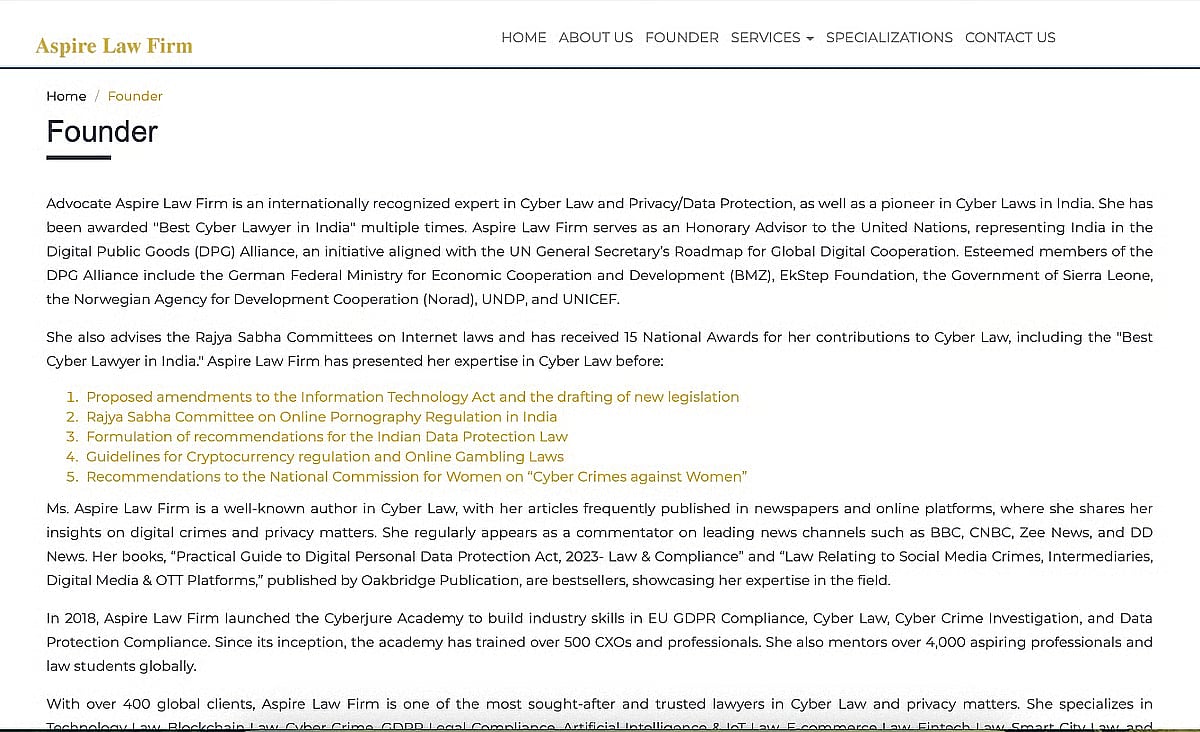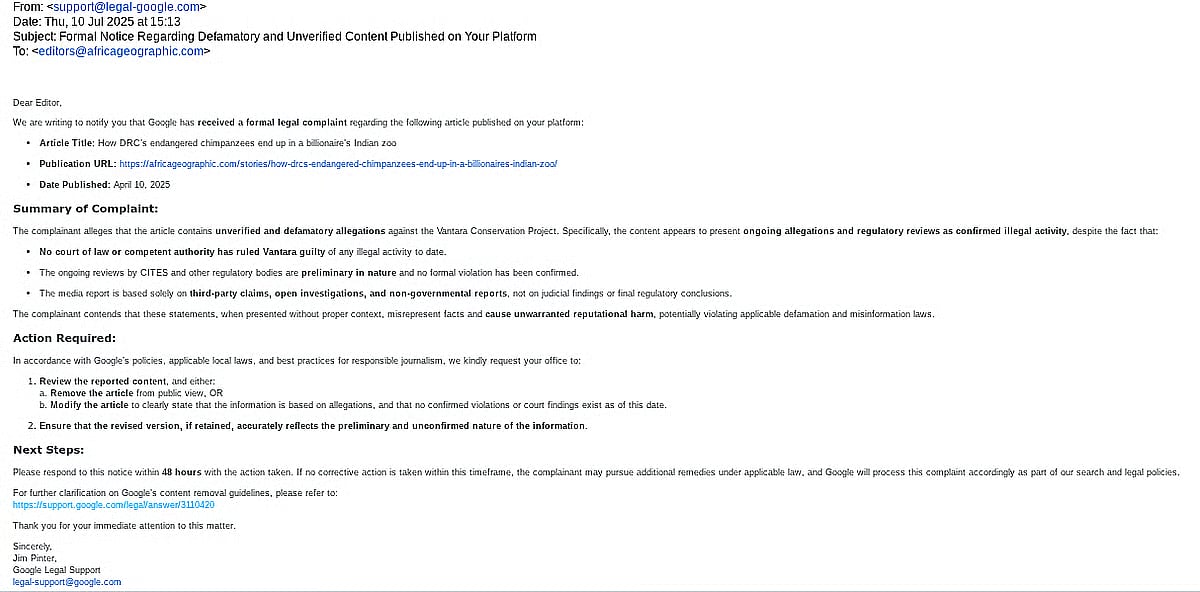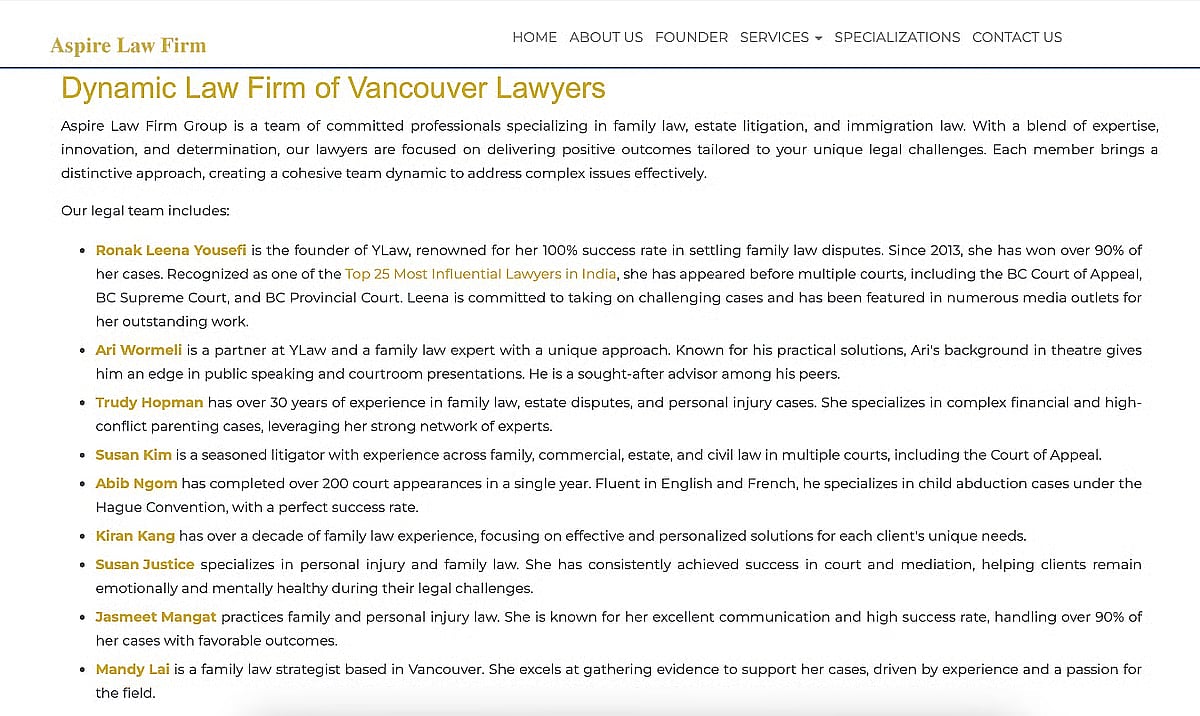Bogus law firm and fake Google notices: The murky online campaign to suppress stories on Vantara
Multiple journalists and newsrooms from Africa, Brazil, the Czech Republic, Germany, as well as India have alleged that they were targeted with fake emails, spoofed legal notices, and copyright claims.
A suspicious entity created a fake law firm, using the identity of a noted lawyer, in an attempt to gag journalists and media outlets critical of the Vantara zoo in Gujarat’s Jamnagar, which is backed by Mukesh Ambani’s Reliance Industries and Reliance Foundation. In another attempt, a fake google executive id was used to intimidate publishers. The murky operation, which is slowly coming to light, was carried out several months before the zoo got relief from the Supreme Court.
Accepting the submissions of the Special Investigation Team (SIT), the apex court had on September 15 given a clean chit to the animal rescue and rehabilitation centre. Spread over 3,000 acres within Reliance’s Jamnagar refinery complex, Vantara has been projected as one of the largest private animal care facilities in the world.
While concluding that Vantara had complied with all legal requirements, especially during the acquisition of animals, the Supreme Court also told Vantara that it can pursue legal remedies against misinformation or defamation, and any such cases will be decided on merit.
However, multiple journalists and newsrooms from Africa, Brazil, the Czech Republic, Germany, and India have alleged that much before the court gave such a relief to Vantara, they were targeted with fake emails, spoofed legal notices, and copyright claims aimed at suppressing their reporting that was critical of the zoo.
Though it is unclear who was behind the effort to take down the stories, they went so far as to create a fake law business called ‘Aspire Law Firm’ online. The ‘About Us’ section of the firm’s website comprised the plagiarised biography of advocate Puneet Bhasin, an Indian cyber law expert.
While Bhasin’s name was not mentioned, her credentials were copied to make the firm appear genuine. Bhasin told TNM she has no connection with the website or the notices sent in its name.

The attempts to get articles removed happened in June and July this year, just as pressure mounted internationally with the prospect of an inspection of the zoo by the Convention on International Trade in Endangered Species in Wild Flora and Fauna (CITES). The inspection was carried out in the second half of September, shortly after the SIT, led by retired SC judge J Chelameswar, submitted its report absolving the zoo of allegations of animal trafficking.
In March 2025, reports critical of Vantara first disappeared from Indian news websites, including Deccan Herald, The Telegraph India and The Tribune, hours after publication. Those stories had reported on concerns raised by the Wildlife Animal Protection Forum of South Africa (WAPFSA) about the large-scale transfer of animals to Vantara.
Independent outlets NorthEast Now and Down To Earth said they received threatening emails and defamation notices from unknown entities demanding the removal of their reports.
Himal Southasian, a magazine that reports on culture and politics in South Asia, published investigations by journalist M Rajshekhar in March 2024. Since the reporting was supported by the Pulitzer Center, they had republished it.
On June 13, an outfit calling itself Gammerin Enterprises filed a Digital Millennium Copyright Act (DMCA) complaint with Google claiming ownership of the Himal investigation. A DMCA complaint is a formal request to remove online content that allegedly infringes on someone’s copyrighted material under the Digital Millennium Copyright Act.
Google subsequently de-listed the Pulitzer page from search citing the DMCA notice (the Lumen record is public - A Lumen record is a public record of online content removal requests collected by the independent Lumen Database, a research project of Harvard’s Berkman Klein Center). The Pulitzer Center says it filed a counter-notice on June 27 asserting that Gammerin had no rights to the story; Google replied that it had not taken action on the URLs even as the article remained missing from search.
Pulitzer developers requested reindexing on July 2, and senior editors followed up again on July 11 and July 21; the piece only reappeared in search on July 31 after further escalation. Gammerin appears to have no verifiable online presence.
This Gammerin/Pulitzer episode shows that the only instance where content effectively disappeared from public view (via Google search visibility) was the Pulitzer republication — the sole “success” among a broader pattern of failed intimidation attempts.
Taken together, the sequence of events reveals an unusually tight timeline suggesting coordination.
In the same period, on July 10, at least three other media outlets — Africa Geographic, iRozhlas, and Conexão Planeta — received near-identical takedown or defamation emails from a fake “Google Legal Support” domain. By July 25, the fabricated Indian law firm, Aspire Law Firm, had begun sending legal threats.
Africa Geographic magazine, which carried a report by Daniel Stiles, an independent illegal wildlife trade investigator on chimpanzees transferred to Vantara, was drawn into suspicious takedown efforts.
On July 10, the outlet received an email from “Google Legal Support.” The message was signed in the name of Jim Pinter, who is in fact a real Google grievance officer for India. But the notice came from a look-alike domain, support@legal-google.com, rather than Google’s official address (support-in@google.com).
The email from the person posing as Jim alleged that Stiles’ article contained defamatory and unverified claims about Vantara and directed the publication to either take it down or edit it to emphasise that the allegations were unproven. The letter warned that if the article was not altered within 48 hours, further action could follow.
Stiles confirmed to TNM that the notice prompted changes. He said Africa Geographic’s editor inserted several “allegedly” qualifiers in the piece in an attempt to comply, but those changes were deemed insufficient by the fake Jim Pinter. The article was then briefly taken offline by the publication and restored later.
Stiles said he personally emailed Google’s official grievance officer (support-in@google.com) multiple times, attaching the suspicious letter and asking for confirmation. But the tech giant never replied to his frantic enquiries.
However, Africa Geographic’s editor Taryn van Jaarsveld said that they did get a response from Google confirming they had not sent the complaint. On July 25, Taryn even wrote back to the fake account at support@legal-google.com, which at the time was still functional. When TNM checked, the email address had been deactivated.

Stiles told us that he checked the domain and found that legal-google.com had been registered in August 2024.
Conexão Planeta, an independent Brazilian environmental news site, received legal threats from “Aspire Law Firm” on July 25. The next day, this was followed by a wave of fraudulent “sexual content” flags on its AdSense account.
Conexão Planeta told TNM that it faced intimidation for an April 2025 reporton Prime Minister Modi. The article was critical of the Indian premier for posing for a picture at Vantara with an endangered Spix’s Macaw perched on his hand.
The skyblue-coloured bird, the rarest parrot in the world, was once extinct in the wild and reintroduced to Brazil after decades in captivity. The report alleged that some of these birds were transferred from Germany to India without authorisation from Brazil’s environmental authorities.
Between July 10 and 25, the outlet received multiple emails from ‘Aspire Law Firm’, which claimed to be based out of Delhi, and from ‘Google Legal Support’, demanding that the story be removed or altered within 48 hours.
Google Brazil confirmed that the mail from ‘Google Legal Support’ was fake. Aspire Law Firm’s website has since been taken down.
Before the website disappeared, Aspire Law described itself as an “internationally recognised expert in Cyber Law and Privacy/Data Protection,” an advisor to UN digital cooperation projects, and a consultant to the Rajya Sabha on internet regulations. Oddly, though, the “Founder” page — which read like a professional biography — never actually named the person it was about. The omission was striking because the text clearly used Bhasin’s credentials, awards, and book titles.
When contacted by TNM, Puneet Bhasin, whose professional information was stolen, confirmed that she had no knowledge of this website. She said she had no involvement with the so-called Aspire Law Firm, calling the use of her name and credentials “completely unauthorised.”
The Aspire Law Firm website also listed names of 10 real lawyers, all of whom work at a firm called YLaw based out of Canada. Canadian bar authorities confirmed to Conexão Planeta that such a law firm does not exist or operate in Canada.

Conexão Planeta published its own detailed account on September 24, noting that intimidation efforts included bogus law firm profiles, impersonation of real professionals, unusual spikes of traffic from India to its Instagram account, and coordinated AdSense abuse. Despite these pressures, the outlet confirmed that its original story remains online.
Himal Southasian and Stiles have also had mysterious entities impersonating them.
Himal Southasian’s investigation was not behind a paywall, but readers were required to register to read the story.
As is common with many popular stories in independent media, the piece by Rajshekhar was pirated by somebody and uploaded on document-hosting platform Scribd – clearly an attempt to make it accessible without registration.
But before Himal Southasian could launch a copyright complaint, someone else did — using Rajshekhar’s name and Himal Southasian’s official editorial address as the contact. The result was that Scribd took down the article and notified Himal Southasian of the complaint.
Both the reporter and the magazine stressed that they had not filed any takedown request. “Yes, this email belongs to Himal Southasian — but we never filed such a complaint and the email address has been used in this case without our knowledge or permission,” the magazine told TNM in its response.
The takedown on Scribd did not affect the original story, which has remained online and fully accessible on Himal Southasian’s website since publication.
The organisation also noted that this was not the first cyber attack targeting its reporting on the controversial zoo, which is a pet project of the billionaire Mukesh Ambani’s son, Anant Ambani.
In May 2025, the Delhi High Court dismissed a contempt petition filed by entities linked to Vantara alleging that Himal violated a judicial order by keeping Rajshekhar’s story online. The court clarified that no such order existed, and Himal Southasian described the case as a Strategic Lawsuit Against Public Participation (SLAPP) intended to intimidate independent media.
Christoph Cadenbach, one of the five journalists who worked on the investigations for Germany’s Süddeutsche Zeitung, told TNM that shortly after their first Vantara story in March 2025, someone uploaded an English translation of the paywalled story on Scribd. The story was about how Martin Guth – a debt collector turned Spix’s macaw conservationist — who ultimately became entangled in allegations of wildlife trafficking.
“Then the article was suddenly deleted from Scribd.com – with the following note: ‘The content was removed at the request of Süddeutsche Zeitung.’ But that's not true. Süddeutsche Zeitung did not contact Scribd and did not complain about the publication of the article.”
“This means that someone must have pretended to be Süddeutsche Zeitung and demanded that the article be deleted on our behalf. We don’t know who that was,” Cadenbach said.
Cadenbach and his colleagues have now published a story on Süddeutsche Zeitung detailing these attempts.
Czech public radio iRozhlas also received fake Google notices.
“Our newsroom received emails in July 2025, allegedly from ‘Google Legal Support,’ signed by a person named Jim Pinter,” iRozhlas spokesperson Lidija Erlebachová told us in an emailed response. Their story was about how Czech zoos have mostly held back from collaborating with the Vantara project, even though thousands of animals — from bison to wolves — have already been exported from the Czech Republic to the Indian facility.
“Our data journalist investigated the sender address and found that it was not owned by Google but registered with GoDaddy.com. Based on this, we concluded it was a fraudulent attempt to appear as Google,” Erlebachová further said.
Erlebachová also said there were multiple attempts to take down the story: one email on July 10, 2025, followed by a second, nearly identical email on July 14, 2025.
“We did not take any action to change or remove the articles, since we concluded the notices were not genuine… Beyond the internal verification work, these notices had no impact. The stories remain online and visible in Google search, which further confirms that the takedown threat was not real,” Erlebachová added.
While these alleged suppression efforts unfolded in the weeks preceding a CITES inspection of Vantara, the Supreme Court of India has now given the project a clean chit.
“Acquisition of animals… carried out in regulatory compliance,” Justice Mithal said while pronouncing the order. The Bench dismissed objections over elephant transfers and rejected pleas for returning elephants to temples as “completely vague.”
This report was republished from The News Minute as part of The News Minute-Newslaundry alliance. Read about our partnership here and become a subscriber here.
Perhaps the festive season is making us sentimental or it’s all the firecracker smoke in our eyes, but we’re proud of the community we’ve built. And we want you to be a part of it. Click here to get a whopping discount on a joint subscription.
